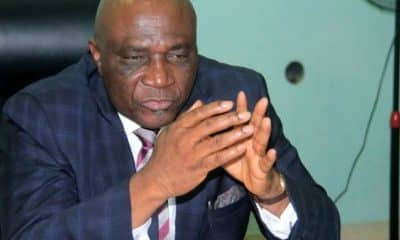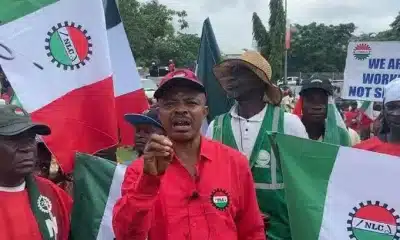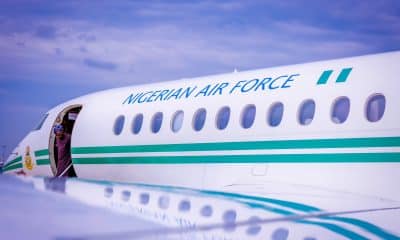Nigeria News
Nigeria Needs A Man Of Integrity To Be Named Petroleum Minister – Falae Tells Tinubu

The former Secretary to the Government of the Federation (SGF) and Minister of Finance, Olu Falae, has emphasized the necessity of having a person with integrity as the Petroleum Minister in Nigeria, rather than the president of the nation.
In a recent interview on Channels Television’s program, Falae criticized the practice of sitting presidents also holding the position of Petroleum Minister.
He acknowledged the significance of petroleum in government finances, noting that no president has completely relinquished control over it. However, he advised President Bola Ahmed Tinubu to appoint a dedicated minister for the sector, allowing him to focus on governance.
“I believe that there ought to be a minister for every important subject in government including petroleum. But I know that petroleum is so important to the finances of government that no president has been able to take his hands off petroleum completely; not Babangida because he had minister of petroleum, not Obasanjo because he had Buhari as petroleum minister; no president has been able to take his hands off petroleum because it is so important but conceptually it is necessary and important to have a man of integrity called the minister to manage petroleum industry on behalf of the president and Nigeria so that he can be held accountable,” Falae said.
Naija News understands that Falae submitted in reaction to criticisms that greeted a comment by former Governor of the Central Bank of Nigeria (CBN), Sanusi Lamido Sanusi, who declared that the President of Nigeria, Bola Tinubu, should not double as the Minister of Petroleum.
Recall that Sanusi made the submission on Thursday while speaking at The Bank Directors Summit held at the Congress Hall of the Transcorp Hilton in Abuja.
According to him, the advice is necessary in order to have someone who can be held accountable because if anything goes wrong in the petroleum sector, people would not want to speak against the President.
The former Emir of Kano also called for the audit of the Nigerian National Petroleum Company Limited (NNPCL), noting that this call was what cost him his job as the CBN Governor.
“Let me advise that the idea of the president being petroleum minister. The last president was the minister of petroleum for eight years.
“When I was governor of CBN, we had a petroleum minister. So when we talk about NNPC, I could attack Diezani now nobody can talk about petroleum because in 8 years if you talk, you are attacking the president,” Sanusi had said.
The former CBN governor’s comment, however, has generated mixed reactions among concerned citizens.
I Share The Same View With Sanusi
Falae said during the live interview that he is of the same view as Sanusi that the position of the Petroleum Minister is occupied by another citizen rather than the president.
“As the former Emir of Kano said, out of respect for the office of the president, people are reluctant to attack petroleum policies because they don’t want to be seen as attacking the president. But if it’s the minister of petroleum, then comments, suggestions and criticisms will be more robust and frequent. I think it’s good for us to have a petroleum minister. Of course, all ministers report to the president, but the president does not have to be a minister for petroleum. That’s my view, and I share that with Alhaji Sanusi,” Falae said.
Continuing the discussion on matters concerning the petroleum industry, the elder statesman highlighted the government’s inability to effectively manage the refineries.
Falae advised the government to undertake the task of repairing Nigeria’s refineries and subsequently selling them to capable entities.
According to him, the government should prioritize the repair and sale of the refineries to competent individuals or organizations. As crude oil is a valuable national resource, the former minister suggest it should be sold at a price that covers production costs along with a reasonable profit margin.
Falae believes that once the government successfully restored and reactivated our refineries, and entrusted their operation to capable hands, Nigeria’s challenges with fuel supply and pricing will be significantly alleviated.
Naira Devaluation Main Cause Of High Inflation In Nigeria
Against the backdrop of the current inflation rate, the former SSG said the primary reason for the current high inflation rate in Nigeria is the depreciation of the naira.
Falae suspected that the scarcity of the naira was a deliberate effort by the government and the Central Bank to control this inflation.
However, if that is indeed the case, he expressed concern that they need to reconsider their approach because the significant price inflation is not primarily caused by an abundance of money supply.
He explained that “As of August 1990 when I ceased to be Minister of Finance, the exchange rate was 5, naira 50 kobo to the American Dollar and that was when we were screaming about SAP. And we could have stabilised it at that level but I left office in August 1990 to go into politics. Thereafter I can’t explain what happened but the naira nose-dived and since then it’s been a free fall, unfortunately. And the consequence is that imports have become extremely expensive. And unfortunately, Nigeria is very highly import dependent.”
Falae further stated that “Once the exchange rate is not right, the naira is weak, then automatically we are importing a lot of inflation to the country. The devaluation of the naira is the main cause of the high level of inflation today in our country. I suspect that the scarcity of the naira is an attempt by the government and the Central Bank to manage this inflation. If that is so, I’m afraid they have to think again because the high level of price inflation is not caused essentially by excess liquidity. It is not what we call demand-pull inflation; it is cost-push inflation, the cost of raw materials of machinery and spare parts. The increased cost in those items is what is causing substantially the inflation we are facing today.
“So, trying to mop up liquidity in my view is not the right thing to do. There may be other reasons for making the naira scarce. But surely, the reason should not be an attempt to manage what is essentially cost-pull inflation through what I call a traditional solution to demand-pull inflation.”
Speaking on the challenges facing the manufacturing industry in the country, Falae said, “The manufacturing sector is almost dead in Nigeria… once power is inadequate, manufacturing will suffer.
“Unfortunately, the manufacturing industry is almost dead in our country. I am very sad to observe that because of the multiplicity of the problems that we have. Unless we revive, revitalise, and resuscitate the manufacturing industry, our dependency on imports will continue, and imported inflation will continue to be a major problem, and the way to revive the manufacturing industry is well known to policymakers.
“And as long as your power supply is inadequate, unreliable, and expensive, manufacturing is going to suffer and products will be very expensive.”












